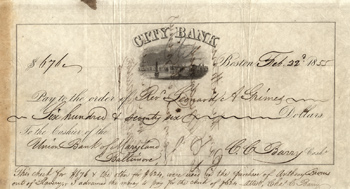Collections Online
Check in the amount of $676, used for the purchase of Anthony Burns, 1855
To order an image, navigate to the full
display and click "request this image"
on the blue toolbar.
-
Choose an alternate description of this item written for these projects:
- Main description
[ This description is from the project: Object of the Month ]
In February 1855, an abolitionist minister in Boston named Leonard Grimes used these two checks to purchase freedom for Anthony Burns, an African American slave whose story had become intimately connected with the city. Burns's quest for freedom, begun in February of the previous year, included a trial and even a riot that comprised major events in the history of mid-19th-century Boston.
Burns was born in Stafford County, Virginia, on the estate of the Suttle family, around 1829. When still a child, he defied local laws by teaching himself to read and write, with the help of local white children. Burns's owner, prosperous businessman Charles F. Suttle, apparently trusted the young man, frequently sending him to work for other businesses. On one such trip to Richmond in February 1854, however, Burns stowed away on a northern-bound ship and escaped to Boston, the home of the abolitionist cause in America. The state of Massachusetts had outlawed slavery.
Burns still had to overcome a substantial obstacle to his freedom: the Fugitive Slave Act of 1850. According to this federal law, runaways to free states in the North could be captured and returned into slavery with only a brief hearing before a court official. When Boston police arrested Burns in May 1854, the law faced its most prominent test.
Within a week after the arrest, Boston abolitionists held a mass meeting at Faneuil Hall. Even before the meeting was finished, a group of angry protesters, led by minister Thomas Wentworth Higginson, marched to the Boston Court House to break Burns out of prison. The attempt failed, and a federal marshal died in the fight. Defense lawyer Richard Henry Dana, Jr., represented Burns in court, but that effort also proved unsuccessful, and tensions rose in Boston as the authorities prepared to return the fugitive to Virginia. Anticipating a large protest, the city arranged for more than 2,000 armed guards to escort Burns from the Court House to the wharf, where a ship waited to take him to Richmond.
Upon his return to the South, Burns was punished and sold to David McDaniel, a North Carolina slave trader. When a group of Bostonians learned of Burns's location, they offered to purchase his freedom. Leonard A. Grimes, a minister and abolitionist, managed to raise only $676, barely half of McDaniel's asking price of $1,300. Charles C. Barry, a Boston bank cashier, agreed to lend Grimes the remainder of the money and wrote out two checks. Well aware of the historical significance of these items, Barry wrote to the bank in Baltimore where the checks were cashed and asked for their return. These materials, along with a small collection of Barry's personal papers, were donated to the Massachusetts Historical Society in 1960. The MHS also holds a collection of papers of defense lawyer Richard Henry Dana, Jr., including two letters from Burns.

